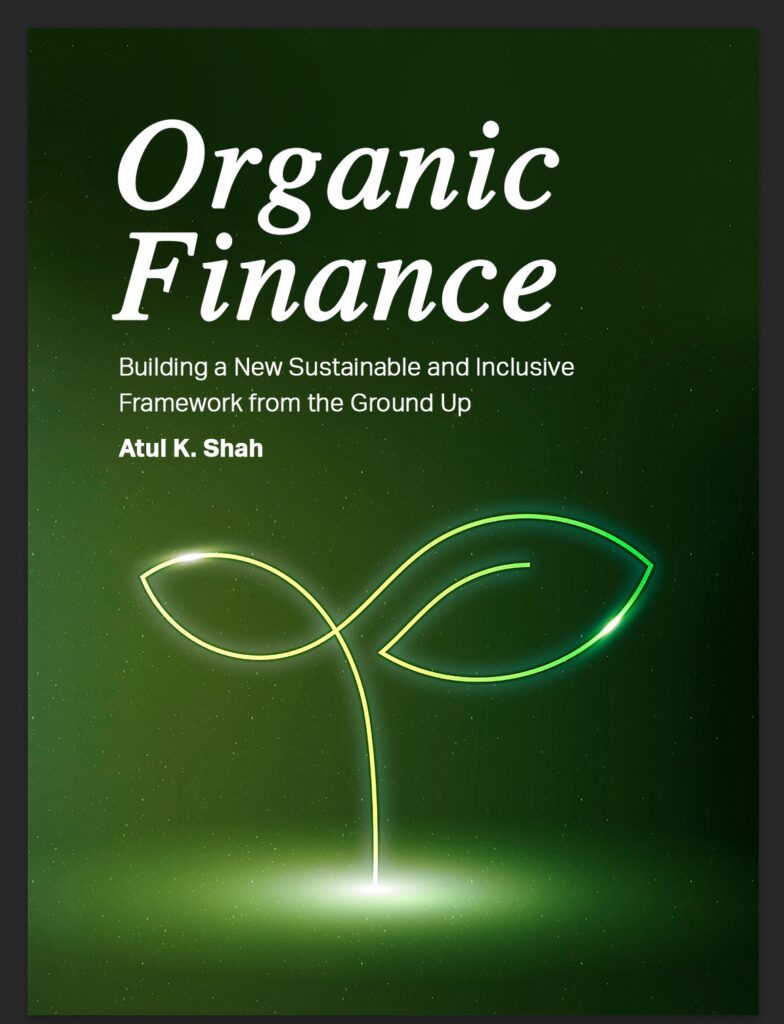PROFESSOR ATUL K. SHAH www.atulkshah.co.uk
Globally renowned expert advisor and broadcaster on culture, accounting, finance, business ethics, holistic education and leadership

In an age of planetary crisis and economic disillusionment, two seemingly distinct movements are converging: one ecological, the other relational. On one side, thinkers like Tiddens call for nature to become the ultimate standard of value. On the other, frameworks like Organic Finance seek to reanimate finance with meaning, care, and moral imagination. What unites them is a shared recognition: value has become dangerously detached from life.
We price everything, but value almost nothing.
🔄 The Problem: Abstraction as Amnesia
Modern economies measure success through abstract indicators—GDP, share price, ROI—while eroding the ecological and social systems on which all value depends. Finance, too, has become a field of metrics and algorithms, increasingly removed from land, labour, and love.
As Tiddens explains in his e-book Nature as Value Standard, available for free as an open-access publication, this abstraction leads not just to environmental degradation, but to a collapse of meaning in economic life. Nature becomes a variable, not a foundation. The economy loses its anchor in regenerative capacity—the Earth’s ability to heal, renew, and sustain.
Meanwhile, in the everyday lives of people—especially the young—finance feels not just disembodied, but disempowering. Debt, burnout, and purposeless work become normalized. The flows of money are not aligned with what truly matters: caregiving, community, ecological repair, spiritual practice.
We are alienated from both the ground beneath our feet and the values in our hearts.
🌍 Tiddens: Nature as Value Standard
Tiddens offers a bold corrective. He proposes that the economy be measured and governed in accordance with nature’s thresholds and rhythms. Rather than treating ecosystems as externalities, we should treat them as baselines. Biocapacity, biodiversity, and energy flow become the new yardsticks of economic health.
This isn’t just about sustainability—it’s about realigning value itself with the capacity of nature to regenerate. Growth must be replaced with sufficiency; extraction with reciprocity. Finance must be restructured to serve life systems, not distort or dominate them.
Tiddens thus presents a macro-political vision: central banks, accounting standards, and policy frameworks must be ecologically literate, ethically grounded, and future-sensitive.
🌾 Organic Finance: Value as Aliveness

Organic Finance, by contrast, asks a different question: how can we live with money in a way that feels alive, ethical, and rooted in relationship?
It recognizes that beyond macro systems, finance is also intimate. It flows through kitchens, communities, rituals, and decisions of care. Organic Finance invites us to see money not just as a tool—but as a carrier of story, a medium of attention, a moral signal.
It calls for new and traditional structures—fellowships, cooperative funds, faith communities —that support work outside markets: care, healing, storytelling, regeneration. And it draws on plural traditions—spiritual, indigenous, ecological—to re-sacralize value.
If Tiddens gives us the map of a new terrain, Organic Finance gives us the language of walking it.
🌿 Shared Roots, Distinct Branches
| Element | Nature as Value Standard (Tiddens) | Organic Finance |
|---|---|---|
| Orientation | Ecological-economic | Moral-relational |
| Scale | Structural, planetary | Personal, communal |
| Main Goal | Align value with Earth’s regenerative capacity | Align finance with life’s ethical, emotional, and spiritual needs |
| Method | Policy reform, biophysical metrics | Financial practices, livelihood design, cultural shifts |
| Shared Belief | Value must be re-rooted in life, not abstraction | Value must be re-rooted in life, not abstraction |
Together, they offer a profound synthesis: a future in which economies honour natural thresholds, and finance honours human dignity.
🔁 Toward a Value System Worth Living In
The crises we face—climate, inequality, disconnection—cannot be solved by tweaking models. We need a new value grammar. One that speaks to the soil and the soul.
To achieve this, we must act on both fronts:
- Anchor value in Earth: Let regenerative capacity guide policy, planning, and pricing.
- Rehumanize finance: Let story, care, and purpose guide how we earn, share, and allocate resources.
Nature teaches us cycles. Communities teach us care. Together, they invite us to build a world where value means more than price—where finance serves life, not the other way around.
It’s time to make value whole again.
